- Home
- John Jakes
The Lawless Page 5
The Lawless Read online
Page 5
The second effect of the storm was a radical deepening of his dislike of his native land. The cause was McGill’s death.
Despite a pose of cynicism, Barton McGill had impressed Matt as a wise and honorable man. Even though he had believed that the Southern cause was hopeless, and the war itself a grand lunacy, to the very end he’d persisted in making runs under sail from Havana to Matamoras. The more prudent Confederate captains had put their feet up on tables in Cuban cafés and waited for an armistice. As a result, they were alive today—and rich—and McGill was dead. That was the way it went in America, Matt came to believe. The selfish prospered while the virtuous perished, forgotten. The politicians stayed safe and grew fat behind the lines while the young men they sent off to carry out their deranged policies died—just as Matt’s younger brother had perished. By the time Grant and Lee met at Appomattox Court House, he was convinced Europe was the only worthwhile place on the globe. And since that was the center of the art world, that was where he would go to learn the techniques of the profession he meant to follow.
Besides, Dolly was in Europe.
It took a while for him to achieve his goal. He spent months on the Texas coast in ’65, recuperating from the injuries he’d suffered in the sea. Several bones had been broken.
From Texas he traveled overland to New York, and a surprisingly warm reunion with his father, who had abandoned a temporary career as a journalist and returned to the ministry. Matt’s mother was dead. Jephtha had remarried. And while Molly Kent would never generate the special affection he felt for Fan, Matt genuinely liked her.
He found he no longer had any serious differences with Jephtha on the subject of the war. Dolly, whom he’d met in Liverpool while McGill was having a ship built there, had persuaded him the South was wrong on the matter of black slavery. His mounting contempt for the raw, amoral country of his birth had made him an easy convert. Unfortunately Jephtha still believed America had a solid if difficult future. Matt tactfully refrained from identifying that belief for what it was—an illusion.
Jephtha had readily agreed to let his second son have a portion of the California inheritance that would one day be his in full. Matt meant to use the funds to pay for his study. He set out for Liverpool, and Dolly, in a fever of enthusiasm.
Together they laid plans for going to the Continent. For a short time they considered Rome or Munich. Each had a flourishing art colony. Both cities finally lost out to the preeminence of Paris.
They’d convinced Dolly’s nervous and proper parents that they would be married before they left England. But they said they couldn’t linger long enough to arrange a full-scale ceremony in Liverpool because Matt was expected to report practically overnight to the École des Beaux-Arts. The truth was, Matt hadn’t even tried to meet the entrance requirements of the renowned state-sponsored school of the French Academy of Fine Arts. He’d made inquiries and found out that the institution’s techniques were formal and old-fashioned. Students spent months just copying from paper silhouettes or plaster casts representing parts of the human body. The true adventurer in the field of art studied independently in the atelier of a good private tutor.
Matt and Dolly had arrived in Paris in ’66, deeply in love with each other, wickedly in love with the notion of living without benefit of wedlock, and instantly in love with the city of light. Matt found a fine teacher, Étienne Fochet. Dolly soon located a good job which she enjoyed and which gave her the satisfaction of helping with their expenses. Down in the city at a private academy called the École Anglais, she taught English to the children of businessmen and diplomats planning to spend a year or so in England or America.
It had been a wonderful, ideal life for three years. There were quarrels, yes. But they were quickly settled, usually by Matt’s ability to bring Dolly to an almost frenzied state of physical arousal. His work progressed reasonably well under Fochet’s abusive guidance. “Do it over, do it over! My God, you won’t even be a tenth-rate colorist unless you develop a better palette! Go study Delacroix! And if you can’t improve, go home to America!”
Fochet used it as a threat because he knew Matt was temperamentally unable to go home. Matt’s dislike of America had been strengthened by his acquaintance with another American artist, some years older, who visited Paris occasionally.
Jim Whistler was a pugnacious little dandy, just five feet four, and the grandest raconteur Matt had ever met. A failed West Point cadet, Whistler was fond of telling how his military career had come to a sudden end. He’d been asked to step to the blackboard and discuss the properties of silicon. “I began by saying, ‘Silicon is a gas.’ If it were, I’d probably be a major general.”
Whistler claimed he couldn’t function in the stultifying, tasteless environment of his homeland. He was a brilliant artist, Matt thought, even if he did bestow curious titles on his paintings—almost as if he wanted to deny that they had subjects. Studies of fireworks exploding in a night sky were “nocturnes.” A portrait of his mother Mathilda who lived with him and his mistress in London—a picture he’d been struggling with since ’66, he complained—was an “arrangement in grey and black.”
Matt now shared Whistler’s contempt for the United States. For that reason he rejected appealing subjects from his past whenever they came to mind. Now Paul had suggested that might be a mistake. But he didn’t see how he could find good art in bad memories.
He had to do something about his work, though. Even a simple portrait of Dolly was foundering. Was it because there were problems with Dolly?
The change in their relationship had been gradual. He couldn’t recall a specific time when it had started. Perhaps, after three years, the novelty of a Bohemian existence had worn off, and Dolly had started to think about the future. He never did that. He seldom even thought seriously about the present. In fact, when he was working, the real world was little more than a peripheral haze. Dolly had begun to let him know that although she understood that, she didn’t like it.
Today he was no better prepared to meet her objections than he had been when she left on the holiday. Well, maybe a visit with her parents had relaxed her a little, he thought anxiously as he made his way through the neighborhood near the Gare du Nord.
ii
The storm clouds had moved in, bringing a sudden shower. He wove his way through crowds near the station entrance, first avoiding a couple of street musicians playing a flute and a curious new instrument called a saxophone, then an open-air dentist who was striking his portable chair and umbrella. He jumped off the curb and across the gurgling water in the gutter so as not to interfere with a couple of the Sûreté specials who were becoming more and more visible as street crime increased. The specials were trussing up a howling, kicking man in rags. A purse grabber, probably.
A flower girl who would have been pretty except for the sores around her lips interrupted her chant of “May your love life flourish!” long enough to sell Matt a bedraggled bunch of violets. She glanced into his eyes, then down at his trousers in case he was interested in an additional transaction. He smiled and shook his head but felt an embarrassing physical reaction to the girl’s invitation. Problems or not, three weeks was a devil of a long time to be without the woman he loved.
He darted out of the rain into the tumult of the station. In an atmosphere of smoke and noise, people rushed to and fro, knocking against one another like balls striking tenpins. Parisians were constitutional hurriers, he’d discovered. Even a pair of sweet-faced nuns almost bowled him over.
A local train arrived with a scream of iron wheels and an eruption of steam. There were several trains standing on the tracks which ran right up to barricades within the central area of the station. He didn’t know which track would receive the Calais express, so he sought the schedule board hanging from iron rafters at one end of the hall.
He found the Calais train and its designated track. As he gazed upward, he became aware of a man standing just to his left, rattling off the numbers of all the lis
ted trains, as well as their arrival or departure times. The man was speaking accented French and had his back to Matt. But there was something familiar about his sleek yellow-brown hair.
A second, gnomelike fellow was copying down the information the first man rattled off. Paris was tolerant of the eccentric, so no one paid any attention except Matt, who thought the man might be carrying a watch.
“I beg your pardon—” Matt began. The man pivoted smartly. Matt recognized him at once, even though this afternoon he was turned out in expensive civilian clothes, including a tan sack coat with dark brown edging, fawn spats on his dark brown pumps and, tucked under his arm, a tan felt hat with a round-blocked crown and wide brown ribbon.
The man had twice been at the café where Matt and his friends congregated. The first time he’d evidently come in by accident. He’d gotten interested in the barmaid, Lisa, and had come back to see her again. On both occasions he’d been wearing a uniform of dark blue with polished jackboots, a sabre and sabretache and a pickelhaube with an ornate Prussian eagle plate on the front and a wicked-looking vertical spike on top.
Lisa hadn’t been impressed or even slightly interested in the man’s heavy humor, his heavy palm slapping her bottom or his heavy-handed announcements that he was attached to the Prussian diplomatic mission in Paris and, therefore, important. Both times, the Prussian had left the café in very bad humor.
Damn funny crowd, the Prussians, Matt thought as the fellow removed a monocle from his eye. They’d whipped the Austrians in ’66 by utilizing the railroads effectively. And here the officer was, boldly copying French railroad schedules in one of Paris’ major depots.
“Well, hello, my friend!” the Prussian said with a lingering look at Matt’s mouth. Uneasily, Matt wondered whether the officer was one of those types who found pleasure with persons of either sex.
The Prussian was just a few years older. He had healthy pink cheeks, bright pale eyes and a dazzling grin. “It was the Café Guerbois, wasn’t it? You’re one of that Batignolles crowd—”
“Good memory, Herr Lepp.” Matt nodded, trying to be cordial despite his dislike of the man’s mixture of arrogance and smarmy charm. The officer stood with one knee turned out and slightly bent.
“Colonel Lepp.” he corrected. “To be quite precise about it, von Lepp. May I ask what you want? I’m rather busy.”
Matt burst out laughing. “Doing what? Fixing up an invasion timetable?”
It was meant as a joke, but Lepp lacked a sense of humor. He stiffened, turned red in the face. The gnomish older man hovering near him scowled.
Abruptly, Lepp realized he’d reacted too strongly. He tried to smile. “Oh, no. I’m merely putting together some information for a commercial study.”
Matt didn’t believe it for a minute. Prussian officers didn’t study rail schedules in order to facilitate freight shipments.
“Believe me,” Lepp went on, “if there is ever any—difficulty between France and the new, unified Germany, it shall not be Prussia who is the aggressor. But it shall not be Prussia who is the loser, either.”
“Look—” Matt raised a placating hand. He forgot he was carrying violets. Lepp snickered. Matt fought to hold his temper. “All I wanted was the correct time. I’ll ask someone el—”
Lepp interrupted with a snap of his fingers. The gnome took out a cheap plated watch and showed Matt the dial: twenty-five until six. He was in time.
He murmured a thank-you and started away. Lepp caught his arm, closing his fingers on Matt’s sleeve in a way Matt found repellant. Lepp’s anise-scented breath washed over him.
“Wait one moment, please. Tell that charming if slightly grubby young woman at the café that I still think of her. Twice refused, I do not consider myself refused permanently.”
A chuckle, a squeeze, and then he let go.
“You must remember Prussia and the Prussian people are accustomed to getting what they want these days. Remind her of that, if you please!” Though he was still smiling, the words had a marked undertone of command.
Matt resented the officer’s tone and manner. “Tell her yourself, Herr Lepp. I don’t pimp for anyone, Prussians included. Good evening.”
Lepp snarled something in his native tongue as Matt walked away. Damn fool to indulge your temper that way! he said to himself. But he’d disliked the Prussian from the moment the man had walked into the café, acting as if he owned it.
He turned and saw Lepp studying him, his monocle back in his eye. The officer’s expression was not at all friendly.
The Prussian pivoted sharply again and returned to charting the train schedules. Matt hoped he’d seen the last of the fellow, but in view of Lepp’s remarks about Lisa, he doubted it.
The Calais train came chugging in at five forty-five on the dot. By then the prospect of seeing Dolly had Matt in a state of physical and emotional excitement. But it was a state tinged with a good deal of tension.
Chapter III
Reunion
i
DOLLY WASN’T AMONG the first passengers who came streaming up the platform. Matt went through an agonizing five minutes as he stared into Gallic eyes and Gallic faces. Had she missed the steamer or thought about their life together and decided she wasn’t coming back?
His spirit began to feel as wilted as the violets. Then, suddenly, he glimpsed a round English face and pink cheeks, and large, lovely eyes of a blue that looked lavender in a certain light. He recognized the neat but out-of-date clothing she was wearing: the plush pelisse, the little Windsor cap of straw with its ostrich-tip ornament perched on her yellow curls. She spied him at almost the same moment, dropped her portmanteau, rose on tiptoe and waved.
He started running against the tide of passengers. He had to travel three car lengths to reach her. What he felt as he rushed along—a powerful, soaring emotion that quite eradicated his apprehension—told him how much he truly loved her.
“Oh Matt, Matt love!” she exclaimed, reaching up for him. Her little gray gloves clasped at the back of his neck. Her cheek, smooth as heavy cream, pressed his darker, sunburned one. Dolly Stubbs was a head shorter than he. She tended to plumpness, but he liked her plump.
He could feel the swell of her corseted breasts against his shirt. Only a couple of passengers paid any attention as they kissed. He wouldn’t have cared if they had an audience of ten thousand. All he wanted to do was savor the sweetness of her parted lips.
“Oh!” she said again, out of breath when they broke the embrace. “Oh, I’ve missed you so terribly!”
“So have I. My God, Doll, three weeks is longer than I ever imagined.”
She understood, laughed and whispered, “Far too long for me. As you’ll discover when I get you alone.”
He raised his hand, offering the violets. “Not as pretty as your eyes, but the best I could do on short notice.” That was said in French. It seemed a more appropriate language in which to frame such a high-flown if heartfelt sentiment.
She inhaled the scent of the flowers, slipped her arm through his and squeezed against him. “Thank you, my darling.”
He picked up her luggage. They walked to the clamorous central area of the station. Lepp was nowhere to be seen now, Matt noted with some relief.
“Have you taken care of yourself?” she asked as they started outside.
With a vaguely surprised expression and perfect sincerity, he said, “I don’t know. I suppose.”
She frowned. “Still having trouble with your work?”
“More than ever.”
“Well, we shall have to talk about that. And some other things, too. The holiday was good for me, Matt. It helped me get some of my thoughts in order.” It was all said in a very light way. Yet he was disturbed, somehow.
As they left the station, the shower stopped. In the west over a long row of chimney pots, a blue sky worthy of a Constable began to appear between racing clouds.
They walked arm in arm in the newly washed spring evening. An old man selling muss
els broke his chant, leaned on the handle of his cart and smiled at them.
“We’ll catch an omnibus up to the butte—” he began.
“Nonsense, we’ll walk. We’re both in good health, and we don’t need to squander our money—even if you will be a California Midas one day.”
He chuckled. He seldom thought about the huge sum he would inherit when his father died. He had no appreciation of the value of money, and placed little importance on having more than a few sous in his pocket.
“We’ve been having unsettled weather, Dolly. Was the channel rough?”
“A bloody tempest!” she declared with uncharacteristic vulgarity. “I couldn’t so much as nibble a biscuit till we docked.”
“How did you find Liverpool?”
She wrinkled her nose. “Grimy as ever.”
“How’s your pa?”
“Still at the Birkenhead.” Her father was a steamfitter at the famous Liverpool shipyard of the Laird brothers. McGill’s last steam-driven blockade runner had been built there, as well as the great Confederate raider Alabama.
“Is the rest of your family well?”
“Yes, fine—though of course they think we’ll be celebrating our wedding anniversary again this year.” She turned to look into his eyes. “Speaking of that, Peg’s found a fellow.”
“What? Is it serious?”
“The wedding’s planned for October. I told them we’d be there if we could.”
He felt a flare of resentment. He hated even having to think about taking time from his work to attend such a meaningless social event. He tried to tell himself it was important to her, but he wasn’t wholly successful in over-coming his irritation.
“Certainly, we’ll try.” His voice sounded strained. “Your father had been worrying about your sister’s prospects, hadn’t he?”

 The Bastard
The Bastard The Furies
The Furies The Bold Frontier
The Bold Frontier The Americans
The Americans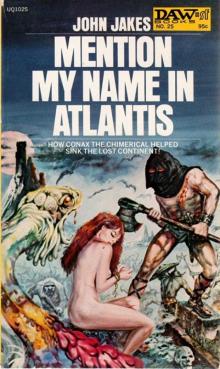 Mention My Name in Atlantis
Mention My Name in Atlantis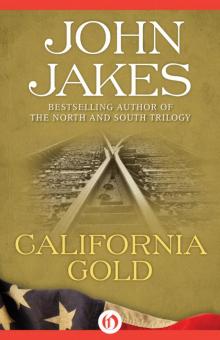 California Gold
California Gold North and South
North and South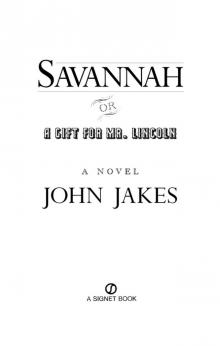 Savannah, or a Gift for Mr. Lincoln
Savannah, or a Gift for Mr. Lincoln Heaven and Hell
Heaven and Hell Homeland
Homeland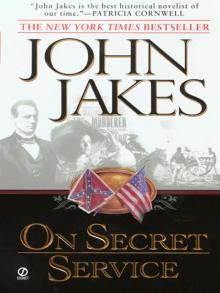 On Secret Service
On Secret Service The Lawless
The Lawless The Titans
The Titans The Seekers
The Seekers Love and War
Love and War North and South: The North and South Trilogy (Book One)
North and South: The North and South Trilogy (Book One) North and South Trilogy
North and South Trilogy Love and War: The North and South Trilogy
Love and War: The North and South Trilogy North and South: The North and South Trilogy
North and South: The North and South Trilogy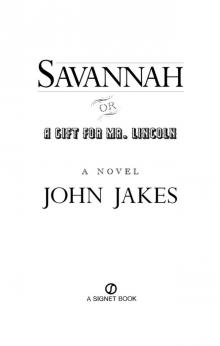 Savannah
Savannah Lawless
Lawless Conquest Of The Planet Of The Apes
Conquest Of The Planet Of The Apes Love and War: The North and South Trilogy (Book Two)
Love and War: The North and South Trilogy (Book Two) The Rebels: The Kent Family Chronicles
The Rebels: The Kent Family Chronicles Heaven and Hell: The North and South Trilogy
Heaven and Hell: The North and South Trilogy Planet of the Apes Omnibus 2
Planet of the Apes Omnibus 2 The Bastard: The Kent Family Chronicles
The Bastard: The Kent Family Chronicles Heaven and Hell: The North and South Trilogy (Book Three)
Heaven and Hell: The North and South Trilogy (Book Three)